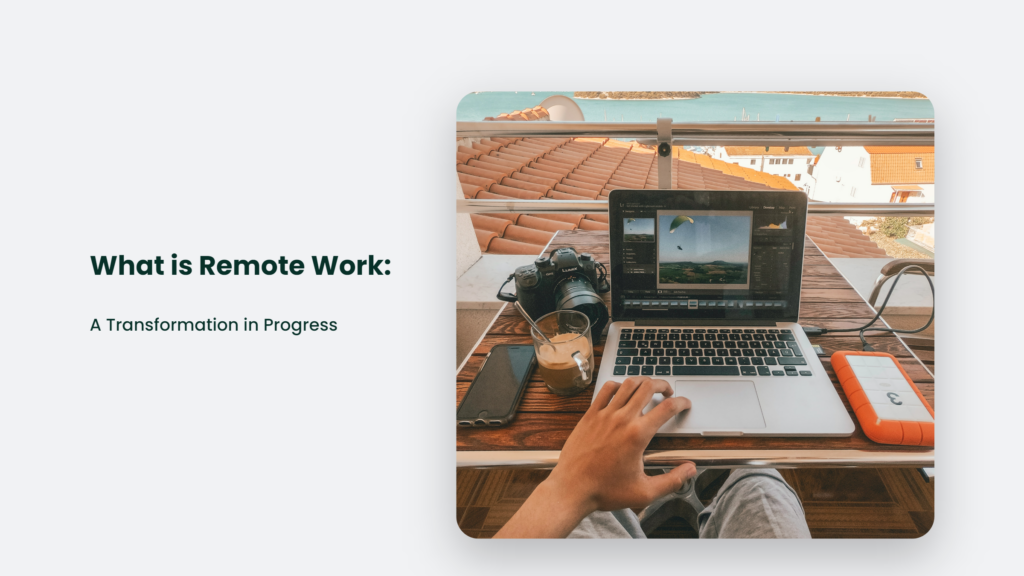

What is Remote Work: A Transformation in Progress

As Seen On
In the wild west of the digital age, there’s a gold rush happening, and it’s called remote work. It’s like a free-for-all buffet: your office is your kitchen, your co-workers are your cats, and your commute is nonexistent. Sounds like a dream, doesn’t it?
But hold onto your horses, partner, because it’s not all sunshine and roses. There’s much to unpack here, so let’s dive right in and figure out What is Remote Work?

What is Remote Work? The ABCs
Remote work, or telecommuting, is a flexible work model allowing professionals to work outside a traditional office environment. It’s like working from home, only fancier. Imagine not having to wake up at the crack of dawn, cramming yourself into a crowded subway, and battling the morning traffic. Doesn’t that sound like a dream?
The Rise and Rise of Remote Work
The COVID-19 pandemic has accelerated this trend of working remotely. But don’t get me wrong, it’s not a new concept. In fact, remote work has been around for a few decades now; only it has gained significant traction recently. As of 2023, 12.7% of full-time employees work from home, while 28.2% work a hybrid model, which combines home and in-office working1. However, most of the workforce (59.1%) still work in-office, reminding us that the traditional workspace isn’t obsolete yet.
The Future of Remote Work: A Crystal Ball Gazing
Looking into the crystal ball, remote work shows no signs of slowing down. An estimated 32.6 million Americans will be working remotely by 2025, which equates to about 22% of the workforce1. This projection suggests a continuous, yet gradual, shift towards remote work arrangements. But why is this shift happening, you might ask? Well, let’s dive into some data.
Why the Workforce Prefers Remote Work
A staggering 98% of workers expressed the desire to work remotely, at least part of the time1. It seems the allure of working in pyjamas is too hard to resist. Jokes aside, the flexibility, autonomy, and work-life balance offered by remote work are hard to beat.
Remote Work and Employers
From the employers’ perspective, 93% plan to continue conducting job interviews remotely1. So, next time you’re asked to dress up for an interview, remember you only need to be business formal from the waist up.
Approximately 16% of companies operate fully remotely, without a physical office1. These pioneers in the remote work paradigm highlight the feasibility of such models, paving the way for others to follow.
Remote Work by Industry
Certain industries seem more inclined towards remote work than others. The computer and IT sectors are leading the way, with other sectors like marketing, accounting and finance, project management, and even the medical and health industry following suit1. Even customer service and HR, traditionally reliant on physical offices, are experiencing the benefits of remote work.
The Good, the Bad, and the Ugly of Remote Work
Remote work. It’s like being a lone ranger in the vast expanse of the digital plains. Sounds pretty cool, right? The freedom, the flexibility, the flannel pyjamas. Who wouldn’t want to work in their flannel pyjamas all day? But like a poorly made latte, it’s not all it’s frothed up to be.
The Good
Let’s start with the good stuff. You’ve heard it all before, haven’t you? No more commuting. More time with family. Increased productivity. Everything that makes you feel like you’ve won the lottery. And it’s true. Studies show that remote workers are 35-40% more productive than their office-bound counterparts and report higher job satisfaction levels. Now, isn’t that something?
The Bad
But, as with everything in life, there’s a flip side. Remote work isn’t all sunshine and rainbows. You’ve got the loneliness, the lack of structure, and the constant need to raid the fridge. It’s like being stranded on a desert island with only a laptop and Wi-Fi connection.
The Ugly
And then there’s the ugly. The blurred lines between work and personal life, the Zoom fatigue, and the lack of physical activity. It’s like a never-ending episode of “The Twilight Zone,” where work is home, and home is work, and you’re not quite sure which way is up.
The Verdict on Remote Work
Is remote work the future?
Only time can give us a definitive answer to that question. But one thing is clear; the trend is on an upswing. The widespread acceptance of remote work and the continuous advancement of technology indicate a future where remote work will play a substantial role. However, it’s also essential to acknowledge that in-person interactions and traditional workspaces will remain valuable.
The question isn’t whether remote work will replace traditional workspaces but how to find a balance that caters to different needs and preferences. A hybrid model, perhaps, could be the answer, offering the best of both worlds – the flexibility of remote work and the camaraderie of an office environment.
So, whether you’re a fan of working from home, prefer the buzz of a traditional office, or love the idea of a mix, the future of work promises something for everyone. And if you’re worried about missing out on water cooler conversations, don’t fret. Virtual coffee breaks are becoming a thing now!
Frequently Asked Questions:
Which industries are leading in remote work?
The computer and IT sector is currently the top industry for remote work. However, other industries such as marketing, accounting and finance, project management, and the medical and health industry (due to the rise of telehealth services and the digitization of health records) are also embracing remote work1.
What are the benefits of remote work for employees?
Employees have expressed a strong preference for remote work due to the flexibility, autonomy, and improved work-life balance it offers. Remote work allows employees to work from the comfort of their homes or other locations, reducing commute times and providing a more customizable work environment.
What are the benefits of remote work for employers?
For employers, remote work can offer benefits such as access to a broader talent pool, potentially lower overhead costs due to reduced need for physical office space, and increased employee satisfaction and retention. Additionally, the ability to operate digitally can provide a degree of business continuity during events that disrupt normal office operations.
How do employers view remote work?
Most employers have embraced remote work. About 93% of employers plan to continue conducting job interviews remotely, indicating a shift towards virtual methods and the recognition of remote work as a sustainable option1.
Conclusion
Embrace the change, folks! Remote work is here to stay, transforming our professional lives in ways we never imagined. As we navigate through this era of change, let’s remember to stay flexible, adaptable, and open to new ways of working. After all, isn’t that what the future of work is all about?
There you have it – a glimpse into the world of remote work. We’ve covered everything from its rise to future projections, the industries adopting it, and the challenges faced. So the next time someone asks you about remote work, you can confidently say, “Been there, read that!
And remember, no matter where you work, what you bring to the table counts. So, let’s roll up our sleeves (or stay in our pyjamas, if you prefer) and get to work!
Konger
Up until working with Casey, we had only had poor to mediocre experiences outsourcing work to agencies. Casey & the team at CJ&CO are the exception to the rule.
Communication was beyond great, his understanding of our vision was phenomenal, and instead of needing babysitting like the other agencies we worked with, he was not only completely dependable but also gave us sound suggestions on how to get better results, at the risk of us not needing him for the initial job we requested (absolute gem).
This has truly been the first time we worked with someone outside of our business that quickly grasped our vision, and that I could completely forget about and would still deliver above expectations.
I honestly can't wait to work in many more projects together!
Disclaimer
*The information this blog provides is for general informational purposes only and is not intended as financial or professional advice. The information may not reflect current developments and may be changed or updated without notice. Any opinions expressed on this blog are the author’s own and do not necessarily reflect the views of the author’s employer or any other organization. You should not act or rely on any information contained in this blog without first seeking the advice of a professional. No representation or warranty, express or implied, is made as to the accuracy or completeness of the information contained in this blog. The author and affiliated parties assume no liability for any errors or omissions.

